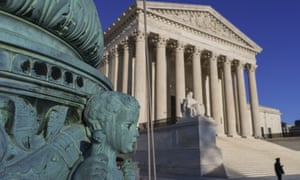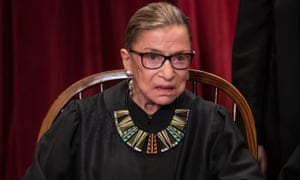Liberals' worst nightmare: a second supreme court pick for Trump
A future conservative nominee could affect issues ranging from women’s reproductive health to LGBT rights
When Donald Trump nominated Neil Gorsuch to the supreme court just weeks after taking office, the newly minted US president made good on a central promise of his campaign – to replace the late justice Antonin Scalia with a bonafide conservative.
That moment foreshadowed what is shaping up to be among the most indelible of
Trump’s triumphs – the reshaping of the federal judiciary with the appointment of dozens of judges with an ideological bent toward the administration’s agenda.
The Republicans are working with Trump to make a record-breaking number of appointments to federal courts. These new, mostly young white males will be in a position to rule on legislation that could reshape America for years.
But the most contentious appointment would be a second nomination to the highest court in the land. The supreme court has over decades delivered landmark decisions on issues ranging from abortion to affirmative action and same-sex marriage. The potential for Trump to install another justice on the nine-seat bench, some legal experts argue, could have profound consequences on issues ranging from women’s reproductive health to LGBT rights.
With speculation mounting over the possible retirement of supreme court justice Anthony Kennedy, Trump could have a lasting impact on reshaping America’s most important court.
“If President Trump fills another vacancy on the court it will have an enormous effect,” said Erwin Chemerinsky, the dean of Berkeley School of Law at the University of California.
“It will create the most conservative court since the mid-1930s,” he added.
“It would mean a majority to overrule Roe v Wade and to allow states to prohibit abortions, to eliminate all forms of affirmative action, to eliminate constitutional limits on illegal police conduct.”
The president himself underscored the power of future vacancies earlier this year, when he tweeted that Republicans “must ALWAYS hold the Supreme Court!”.
While it is not unusual for presidents to appoint supreme court justices with similar ideological leanings, Trump’s comments all but reinforced that he is unlikely to nominate a consensus pick if provided the opportunity. In November, the president updated his shortlist of candidates for a hypothetical vacancy, adding to a roster of proven judicial conservatives.
While the likelihood of a pending vacancy is far from confirmed, judicial watchers have set their sights on Justice Ruth Bader Ginsburg, a progressive icon who turned 85 this year, and Kennedy, a critical swing vote who has been the subject of retirement rumors for the second straight year.
Any vacancy prior to 2020 would almost certainly be filled by Trump, and a rules change adopted by Republicans during the Gorsuch nomination fight enabled the Senate to confirm supreme court justices with a simple majority vote.
Under the current balance of the court, Kennedy and the chief justice, John Roberts, though conservative appointees, have at times sided with the bench’s liberal justices.
Kennedy was the architect of several major decisions pertaining to LGBT rights, most notably the supreme court’s milestone ruling in 2015 establishing same-sex marriage as the law of the land. He is being closely watched as the likely deciding vote on the court’s highly anticipated decision regarding a case of a baker in the state of Colorado who refused to provide a wedding cake for a same-sex couple.
Camilla Taylor, the director of constitutional litigation at Lambda Legal, a national civil rights group focused on LGBT issues, said Kennedy’s previous decisions in the LGBT community’s favor “helped bring our relationships and our families out of the shadows and recognized the full humanity and citizenship of our community on the court”.
Taylor voiced concern that a second Trump supreme court nominee would present “an immediate and unambiguous threat to the LGBT community.”
“Another conservative Trump justice would jeopardize our right to marry who we love, and also our fundamental equality under the law including protections from discrimination in housing, public accommodations, employment and education.”
Some nonetheless argue that if the speculation around Kennedy’s departure proved true, it would not fundamentally alter the supreme court.
Brian Fitzpatrick, a professor of law at Vanderbilt University Law School, said Republican vows to overturn Roe v Wade, the supreme court’s 1973 ruling that legalized abortion in the US, are more designed to energize conservative voters than they are grounded in reality.
“Even if we have a more conservative replacement for Kennedy, the conservatives are not going to overrule the right to an abortion, they’re not going to overrule gay marriage,” Fitzpatrick said.
“The reality is the big cases where he goes with the liberals are cases that I doubt the conservatives have the stomach to reverse, even if they had the votes next year,”
“That would be too dramatic a change in our society,” he added. “It would cause all kinds of turmoil and backlash in the political system.”
“People like Chief Justice Roberts, he’s a very institutionally minded person. He’s not going to risk the supreme court’s credibility and consistently by operating it like a weathervane.”
If Trump were to oversee a supreme court vacancy, a prevailing question remains as to whether Democrats in the Senate would force a similar blockade of the seat as Republicans did under former president Obama - should they retake the Senate in November’s elections
Democratic wounds have yet to heal over the refusal of Republicans to grant Merrick Garland, Obama’s nominee to replace Scalia in 2016, a hearing or a vote.
The Republican opposition came despite the fact that Garland held a reputation as a widely respected centrist judge on the US appeals court.
Progressives now believe Democrats should give any future Trump nominee what has become known in Washington as “the Garland treatment”.
Prominent Democrats have signaled reservations about resorting to the same tactics, which they argue would risk further eroding institutional norms. But Senator Elizabeth Warren, of Massachusetts, suggested an overtly partisan pick by Trump would not receive much of an audience with Democrats.
“The question is who you put up,” Warren said in an interview with Pod Save America, a political podcast hosted by former Obama aides.
“The people that George W Bush would put in wouldn’t be exactly the same as the people that Barack Obama would put in. But they’d be along the same road.”
Warren noted that the climate had changed, even as she conceded it was counterproductive to follow in McConnell’s footsteps and state from the outset that Democrats would block any Trump nominee regardless of background.
“I think that’s wrong,” she said. “But I do think you send a Neil Gorsuch to us, and the answer is no. We do hearings, we do it substantively, but the answer would be no.”
McConnell, for his part, has said any supreme court vacancy this term would be dealt with expeditiously and before the midterm elections.
“It would be a top priority,” he told NPR last week.
“If we get a vacancy on the supreme court this year, we’ll deal with it.”



Imagine the economic miracle if affirmative action were abolished!
ReplyDelete